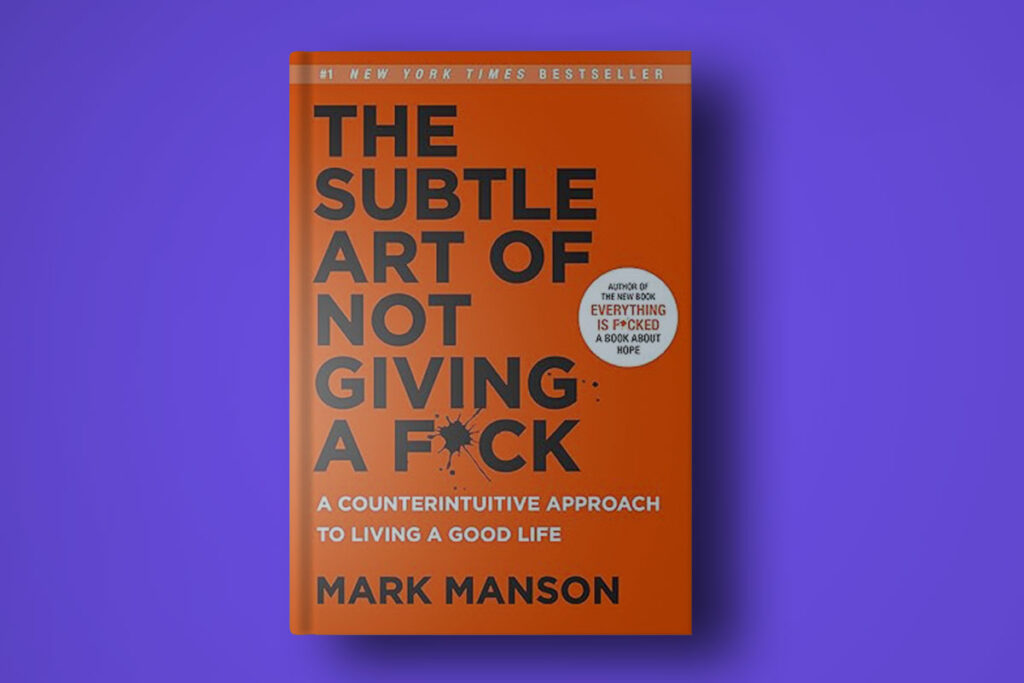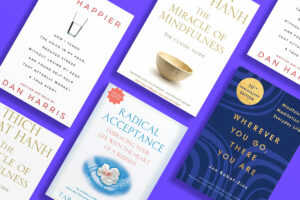
Mark Manson’s “The Subtle Art of Not Giving a F*ck” is a counterintuitive approach to living a good life, which has resonated with millions of readers worldwide. Published in 2016, the book quickly became a bestseller, known for its blunt, no-nonsense language and refreshing perspective on what it means to live a fulfilling life. This review explores the core themes of the book, its strengths and weaknesses, and its relevance in today’s world.
Overview of the Book
Title: The Subtle Art of Not Giving a F*ck: A Counterintuitive Approach to Living a Good Life
Author: Mark Manson
Publication Year: 2016
Genre: Self-help, Non-fiction
Mark Manson, a popular blogger and author, presents a philosophy that challenges the typical self-help narrative of relentless positivity and endless ambition. Instead, Manson advocates for a more grounded and realistic approach to life, focusing on what truly matters and letting go of what doesn’t.
Core Themes
1. The Value of Suffering
Manson begins by asserting that life is filled with struggles and pain, and rather than avoiding these experiences, we should embrace them as essential parts of the human experience. He argues that our struggles define our successes and that choosing what to care about wisely is crucial for a meaningful life.
Quote: “The pain you pursue in the gym results in better all-around health and energy. The failures in business are what lead to a better understanding of what’s necessary to be successful.”
Manson’s perspective on suffering is rooted in the idea that pain and discomfort are inevitable parts of life. By accepting this reality, individuals can focus their energy on overcoming challenges and growing from their experiences. This approach contrasts sharply with the more traditional self-help messages that often emphasize avoiding pain and seeking constant happiness.
2. Choosing What to Care About
The book’s central thesis is about choosing what to give a f*ck about. Manson emphasizes that we have a limited number of things we can genuinely care about and that trying to please everyone or achieve everything leads to frustration and burnout. Instead, he suggests focusing on what aligns with our values and letting go of the rest.
Quote: “Maturity is what happens when one learns to only give a fck about what’s truly fckworthy.”
This concept encourages readers to prioritize their values and make deliberate choices about where to invest their time and energy. By focusing on what truly matters, individuals can lead more fulfilling and purpose-driven lives. Manson’s advice to “give fewer f*cks” is a call to simplify one’s life and concentrate on meaningful pursuits.
3. The Importance of Boundaries
Manson discusses the importance of setting boundaries in relationships and personal goals. He explains that saying “no” to things that don’t matter enables us to say “yes” to things that do. This selective approach to caring helps maintain mental and emotional health.
Quote: “You can’t be an important and life-changing presence for some people without also being a joke and an embarrassment to others. You just can’t.”
Setting boundaries is crucial for maintaining a healthy balance in life. Manson highlights that by establishing clear limits, individuals can protect their time, energy, and emotional well-being. This principle is particularly relevant in a world where constant connectivity and the pressure to be always available can lead to burnout.
4. Accepting Responsibility
Taking responsibility for our actions and emotions is another key theme. Manson argues that while we may not be at fault for everything that happens to us, we are responsible for how we respond. This shift from blame to responsibility is empowering and crucial for personal growth.
Quote: “The more we choose to accept responsibility in our lives, the more power we will exercise over our lives.”
Manson’s emphasis on personal responsibility encourages readers to take control of their lives. By acknowledging their role in shaping their experiences, individuals can make proactive changes and foster a sense of empowerment. This perspective aligns with the principles of cognitive-behavioral therapy, which emphasizes the importance of taking responsibility for one’s thoughts and actions.
5. The Realization of Mortality
Manson encourages readers to reflect on their mortality as a means to prioritize what truly matters. Recognizing that life is finite helps strip away superficial concerns and focuses our attention on what is genuinely important.
Quote: “You are going to die someday. Everyone you know is going to die soon. And in your short life, you only have so much time.”
The realization of mortality serves as a powerful motivator to live authentically and with purpose. Manson’s reminder of life’s brevity encourages readers to let go of trivial worries and focus on meaningful pursuits. This existential perspective can inspire individuals to make the most of their limited time.
Strengths of the Book
1. Refreshing Honesty
One of the book’s greatest strengths is its honesty. Manson doesn’t sugarcoat the realities of life and instead provides a raw and unfiltered perspective. This candor is both refreshing and relatable, making the book a standout in the self-help genre.
2. Practical Wisdom
Manson offers practical advice grounded in real-life experiences and psychological principles. His approach is accessible and actionable, encouraging readers to make tangible changes in their lives rather than relying on vague motivational platitudes.
3. Engaging Writing Style
Manson’s writing is engaging and humorous, making complex concepts easy to understand and enjoyable to read. His use of personal anecdotes and contemporary references helps to illustrate his points effectively.
4. Contrarian Perspective
By challenging the conventional self-help narrative of relentless positivity, Manson provides a contrarian perspective that resonates with those who feel alienated by traditional self-help advice. His emphasis on embracing negative experiences as part of life is both realistic and empowering.
Weaknesses of the Book
1. Language and Tone
While many readers appreciate Manson’s blunt language and casual tone, it may not appeal to everyone. The frequent use of profanity, while intended to be humorous and impactful, might be off-putting to some.
2. Over-Simplification
In some instances, Manson’s arguments may come across as overly simplistic. While the core messages are valuable, the complexity of certain life situations might be underrepresented, leading to a perception that the solutions offered are too straightforward.
3. Repetitiveness
Some readers may find the book repetitive, with similar points reiterated throughout the chapters. While repetition can reinforce key messages, it might also lead to a feeling of redundancy for those looking for more varied content.
Relevance in Today’s World
“The Subtle Art of Not Giving a F*ck” remains highly relevant in today’s fast-paced and often overwhelming world. With the rise of social media and the constant pressure to achieve and present a perfect life, Manson’s message of focusing on what truly matters and letting go of superficial concerns is more pertinent than ever.
In a society that often glorifies busyness and constant positivity, Manson’s approach encourages readers to embrace a more balanced and realistic view of life. His emphasis on setting boundaries, taking responsibility, and accepting the inevitability of suffering provides a grounded framework for personal growth and fulfillment.
Key Takeaways for Readers
- Prioritize What Matters: Focus on what aligns with your values and let go of what doesn’t. Not everything is worth your time and energy.
- Embrace Suffering: Recognize that struggles and challenges are part of life and can lead to growth and success.
- Set Boundaries: Learn to say “no” to things that don’t matter to make room for what does.
- Take Responsibility: Accept responsibility for your actions and emotions to empower yourself and drive personal growth.
- Reflect on Mortality: Use the realization of your mortality to prioritize what is genuinely important in your life.
Additional Insights
The Role of Social Media
Social media has amplified the pressure to appear perfect and successful, often leading to anxiety and dissatisfaction. Manson’s advice to give fewer f*cks is especially relevant in this context. By focusing on what truly matters and setting boundaries around social media use, individuals can protect their mental health and prioritize meaningful connections.
Practical Tip: Limit social media usage and curate your feed to include only positive, inspiring content that aligns with your values.
Embracing Imperfection
Manson’s philosophy encourages readers to embrace their imperfections and accept that failure is a natural part of life. This mindset shift can reduce the fear of failure and encourage more authentic living.
Quote: “The desire for more positive experience is itself a negative experience. And, paradoxically, the acceptance of one’s negative experience is itself a positive experience.”
The Importance of Values
Manson emphasizes the importance of identifying and living according to one’s values. By aligning actions with values, individuals can find greater satisfaction and purpose in their lives.
Exercise: Take time to reflect on your core values and assess how well your daily actions align with them. Make adjustments as needed to live more authentically.
Real-Life Applications
1. Career Choices
Applying Manson’s principles to career choices can help individuals focus on what truly matters to them professionally. Rather than pursuing a career based solely on external validation or financial gain, individuals can choose paths that align with their values and passions.
Example: A person passionate about environmental conservation may choose to work for a non-profit organization rather than a high-paying corporate job that doesn’t align with their values.
2. Personal Relationships
Setting boundaries and prioritizing meaningful connections can improve the quality of personal relationships. Manson’s advice encourages individuals to invest in relationships that bring joy and fulfillment while letting go of toxic or superficial connections.
Example: Focusing on deepening relationships with close friends and family rather than trying to maintain a large number of casual acquaintances.
3. Health and Wellness
Embracing suffering and taking responsibility for one’s actions can be applied to health and wellness goals. Recognizing that achieving fitness or wellness goals involves discomfort and persistence can lead to more sustainable and fulfilling outcomes.
Example: Understanding that regular exercise and healthy eating require effort and discipline, but the long-term benefits are worth the short-term discomfort.
Enhancing Your Understanding with BookBits
For those looking to deepen their understanding of the principles outlined in “The Subtle Art of Not Giving a F*ck” and explore similar concepts, BookBits Audiobook Summaries offers concise summaries of top self-help books. Here are some recommended reads:
1. “Atomic Habits” by James Clear
James Clear’s “Atomic Habits” provides a comprehensive guide to building good habits and breaking bad ones. The book’s practical advice on habit formation complements Manson’s emphasis on taking responsibility and making intentional choices.
2. “The Power of Now” by Eckhart Tolle
Eckhart Tolle’s “The Power of Now” focuses on mindfulness and living in the present moment. Tolle’s teachings align with Manson’s message of letting go of unnecessary worries and focusing on what truly matters.
3. “Daring Greatly” by Brené Brown
Brené Brown’s “Daring Greatly” explores the power of vulnerability and embracing imperfection. Brown’s insights into vulnerability and courage provide a deeper understanding of Manson’s advice to accept suffering and failure as part of life.
By utilizing resources like BookBits, you can gain valuable insights from these and other top self-help books, helping you apply Manson’s principles to various aspects of your life.
Conclusion
“The Subtle Art of Not Giving a F*ck” by Mark Manson offers a refreshing and realistic approach to personal development. Its candidness, practical wisdom, and engaging writing style make it a valuable read for anyone seeking to live a more meaningful and fulfilling life. While the language and tone may not suit everyone’s taste, the core messages of prioritizing what matters, embracing suffering, and taking responsibility are universally applicable.
In a world filled with constant pressure to succeed and present a perfect image, Manson’s philosophy provides a grounded and empowering framework for personal growth. By focusing on what truly matters and letting go of superficial concerns, individuals can lead more authentic and satisfying lives.
For more insights and summaries of impactful self-help books, explore BookBits Audiobook Summaries. Access concise summaries of top books to stay informed and inspired on your journey to personal growth and fulfillment.


